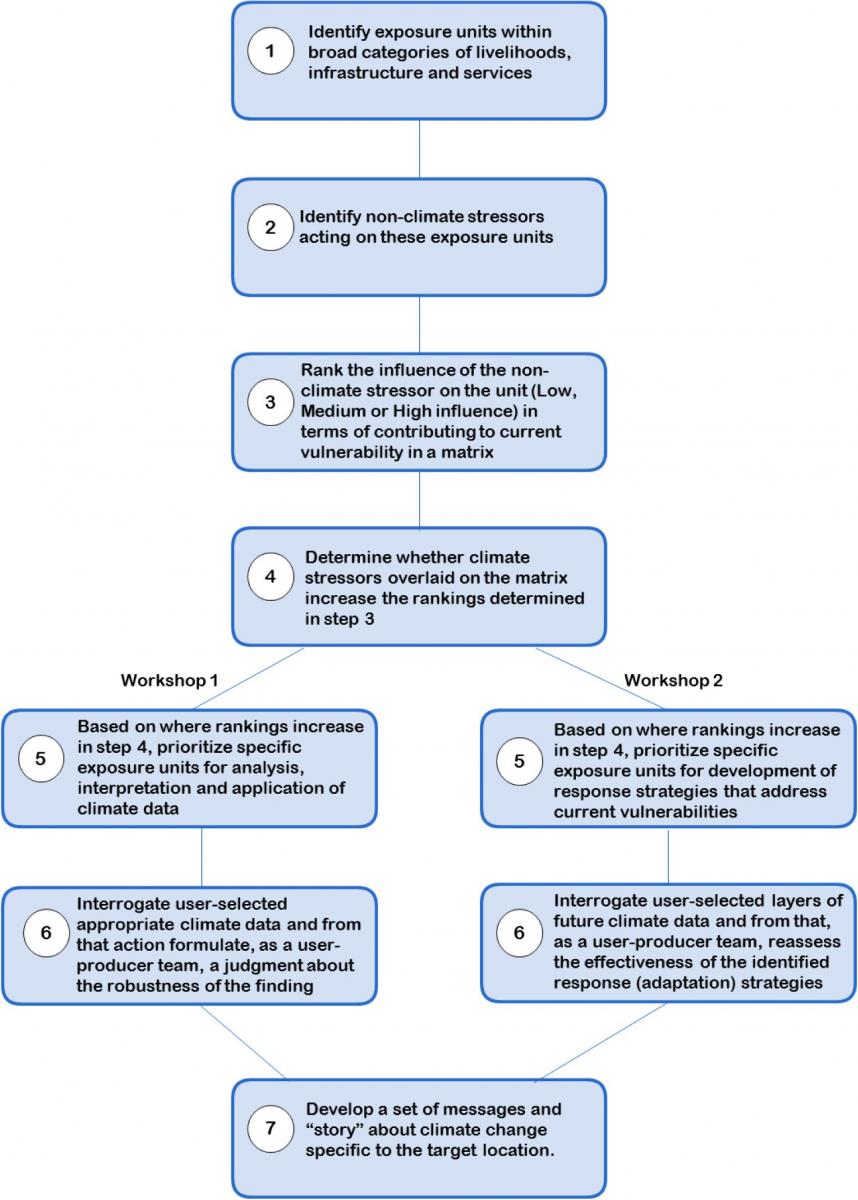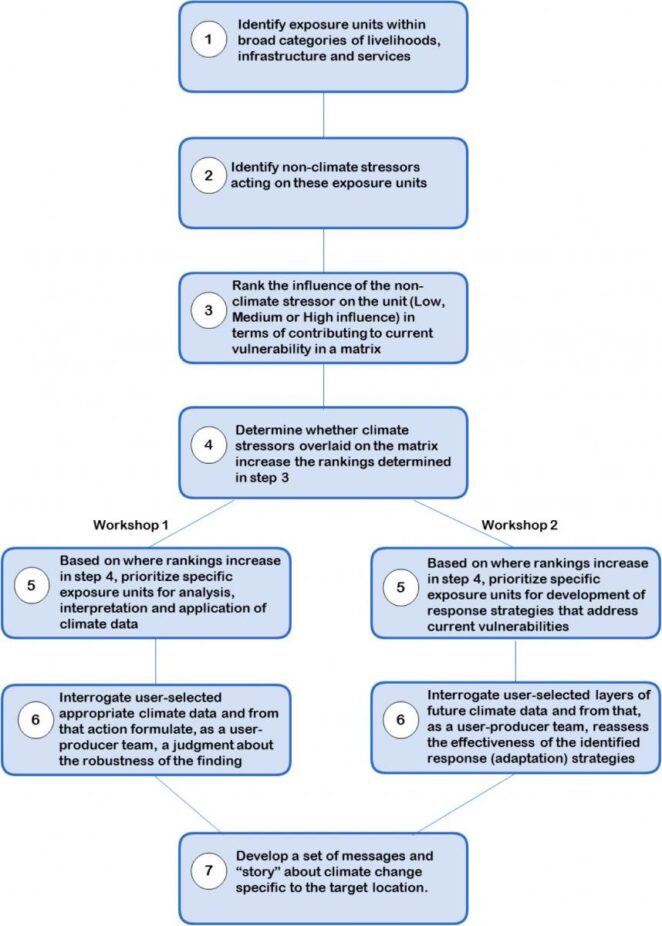Article /
Co-exploratory climate risk workshops: Experiences from urban Africa

Introduction
Many decision-makers operate in a highly complex decision space where decisions are seldom made in isolation. They usually have to consider multiple sectors, disciplines, or locations that are interlinked and interdependent. Climate is just one of these considerations.
Climate data is being provided into this decision space largely through a science-driven process. Often though, this climate information is devoid of vital guidance information about how the data were generated or whether or not any evaluation process was undertaken to test the validity and robustness of the climate data product, and users are frequently ill equipped to determine this for themselves. Overcoming the disconnect between climate data supply and application requires a fundamentally different kind of engagement between the science (producer) community and the broad array of potential end users of climate information.
This paper* presents a process to advance an emerging variation on co-production specific to collaborative decision-making in the context of varying African cities. This process, referred to here as ‘‘co-exploration”, is a nuanced form of co-production. Fundamental to the co-exploration approach is that the process builds its foundation on place-based multi-sector development challenges. You can read more about the FRACTAL principles of transdisciplinarity, co-production and co-exploration here. The principles are also explored in the FRACTAL podcast series.
*This article provides a summary of the process. For more insights into the co-exploration workshops and reflections on the process, read the full article.
Climate data co-exploration: a vulnerability-matrix approach in Africa
The co-exploration approach was initially formulated through a series of workshops aimed at integrating climate information into municipal adaptation plans in the Western Cape of South Africa. Through this workshop series, the place-based vulnerability-driven framing emerged as an important theme worthy of further articulation. With that grounding, a methodology for facilitating co-exploration of urban decision-making was subsequently developed and piloted through a pair of workshops held in Dar es Salaam in 2013 and Accra in 2014.
Development of the matrix
The two urban workshops were organized around the group development of a matrix, which incorporates a step-wise layered process for identifying points of intersection between non-climatic and climate stressors and for prioritizing where climate data would be most appropriately applied to inform decision making. Fig. 1 presents the step-wise workshop process that was used to guide the group discussions.

The matrix development proceeded in a step-wise manner that:
- First involved identifying exposure units related to livelihoods, infrastructure and services that occur in the area of study (Step 1, Fig. 1).
- Next, non-climate stressors that act on these exposure units were identified and ranked according to whether they exerted a low, medium or high level of stress (L, M or H) on the particular elements (Steps 2 and 3, Fig. 1).
- After that ranking, current climate stresses that influence the exposure units were identified (Step 4, Fig. 1), and a determination was made whether these climate stresses intensified the overall stress on the exposure units by an increase in ranking from a lower to a higher stress level.
- The process of matrix development then provided a basis for the teams to select a subset of high priority matrix cells for further investigation with climate projections data, in Steps 5–7.
- For the future climate data analysis (Step 6, Fig. 1), groups were given a suite of location-specific climate data and information in stages. Within each city group, key messages were then developed regarding changes in each of the parameters. These changes were incorporated into the matrix to identify areas of potentially increased vulnerability resulting from climate change.
- Lastly in Step 7 (Fig. 1) the groups developed a set of succinct policy messages about climate change specific to the target locations examined in the workshop.
Conclusions
- The step-wise co-explorative approach used to facilitate these workshops allowed for a valuable exploration of the decision-making process amongst sets of multi-disciplinary teams.
- However, the approach also reinforced the difficulties of engaging two very different communities within the same intellectual space.
- The matrix approach allowed for the identification of critical vulnerabilities that then provided a contextualized basis for identifying appropriate response strategies while considering the implications of climate.
- Moreover, the focus on a placebased situation rather than a sectorally based one promoted discovery of important inter-linkages that influence how cities respond to stresses and shocks, and is reflective of actual decision-making in African cities.
- The workshops served to highlight the significant socio-economic and socio-political concerns in various African cities and the, potentially, overinflated role that climate is given in a purely science-driven approach to decision-making, while still emphasizing the need to include climate information at appropriate junctures to avoid poor responses to the future climate.
- It is acknowledged that this approach is resource and time intensive and a workshop approach provides a reasonably small sphere of impact on a limited number of participants.
- The challenge is to enable this process to continue beyond a workshop and to facilitate co-exploration in the workplace decision-making context. Perhaps the first step towards this ideal is to continue to build capacity in a shared language through sustained co-exploration between users and suppliers of information.
This article was written by A. Steynor (Climate System Analysis Group [CSAG], University of Cape Town, South Africa), J. Padgham (System for Analysis, Research and Training [START], USA), C. Jack (Climate System Analysis Group [CSAG], University of Cape Town, South Africa), B. Hewitson (Climate System Analysis Group [CSAG], University of Cape Town, South Africa) and C. Lennard (Climate System Analysis Group [CSAG], University of Cape Town, South Africa).
Suggested citation
Steynor A., Padgham, J., Jack, C., Hewitson, B., and Lennard, C. Co-exploratory climate risk workshops: Experiences from urban Africa. Climate Risk Management 13 (2016) 95–102
Related Articles
- FRACTAL project website
- FRACTAL: Future Resilience for African Cities and Lands
- Co-producing climate knowledge – Great in theory, but how about practice?
- Africa's Climate: Helping decision-makers make sense of climate information
- An Embedded Researcher approach to integrate climate information into decision making in southern African cities
- Dialogue for decision-making: unpacking the ‘City Learning Lab’ approach
- “How-to” Guide: Co-exploring Terminologies
- Transdisciplinarity, co-production, and co-exploration: integrating knowledge across science, policy and practice in FRACTAL
- FRACTAL Podcast Series - Exploring transdisciplinary approaches to support resilience and adaptation decision making
